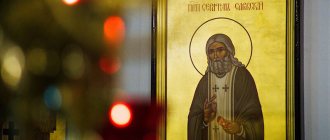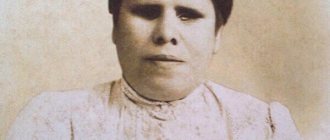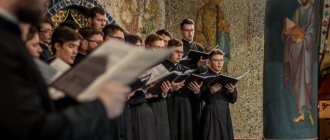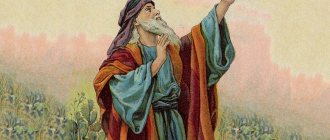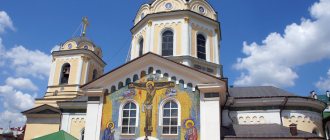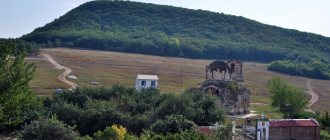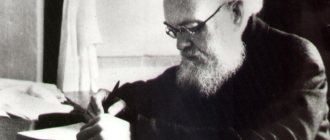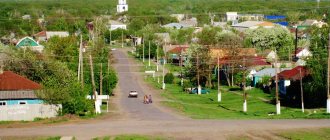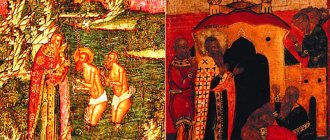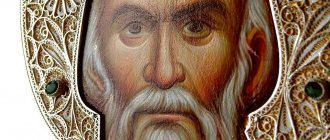Preface
Archbishop Luka (in the world Valentin Feliksovich Voino-Yasenetsky) lived and worked during a difficult period for our country - at the end of the 19th and in the first half of the 20th century, during the years of spiritual crisis, people’s retreat from the faith, wars, revolutions, political repressions, persecution of Church. This is our contemporary - an outstanding doctor and scientist, a brilliant surgeon who saved thousands of lives, a shepherd and preacher, a theologian, an ascetic who restored the churches of God at an unthinkable time, a confessor glorified by the Church, who has shone in the Russian land, performing miracles to this day through the prayers of those who flow with faith. to him. The narrow path of suffering for the truth and serving people, always against the “convenient” current, always faithful to God and love for man - the bright and amazing life of a Christian in times of apostasy, fear and betrayal. Saint Luke lived for eleven years in prisons, camps, and exile. With his spiritual feat and selfless work as a surgeon and “peasant” doctor, he gained nationwide love.
In the 1920s, at the height of the persecution of the Church and its ministers, he became a priest, took monastic vows with the name Luke in honor of the apostle and evangelist, and then was secretly ordained Bishop of Tashkent and Turkestan. Next were the Krasnoyarsk and Tambov departments. In 1946, Archbishop Luka was transferred to Simferopol - his last place of service.
Wherever he was, he served without fear or doubt, preached and treated people, defended the Orthodox faith and the Church in deed, word and writing.
Saint Luke died on June 11, 1961, Sunday, the day of All Saints who shone in the Russian land. Canonized by the Russian Orthodox Church in the host of new martyrs and confessors of Russia for church-wide veneration in 2000.
His Holiness Patriarch Kirill of Moscow and All Rus', making a pastoral visit to the Ukrainian Orthodox Church, venerated the relics of St. Luke resting in the cathedral church of the Holy Trinity Convent in Simferopol. In his word to the flock, His Holiness said:
“...With trepidation I touched the relics of St. Luke, practically our contemporary. I did not have the opportunity to meet him personally, but I had the opportunity to hear a lot about him from those who served with Vladika Luka, who knew him well. He truly was a marvelous archpastor, combining service to the Church and service to science, combining the ability to work in the secular system in the conditions of an atheistic state and at the same time be an archpastor of the Church.
The example of St. Luke teaches us how to find a way out of a seemingly hopeless life situation, how, without compromising with conscience, to be peaceful and calm and to rationally arrange our earthly existence.
Saint Luke was such a person: it would seem that external circumstances suppressed him, but he never broke under this pressure and retained his inner strength, because this strength was in the Orthodox faith. He felt the presence of the Lord in his life and therefore was not afraid of anything, was not afraid of anything, did not shy away from anything, but courageously, with love for people and in peace, he carried out his archpastoral service. Today Saint Luke is a great and bright example for many of us.” [16.]
The Lord Jesus Christ is always the same. We, who are bustling around in a modern “civilized” society, must understand and remember with all our souls and all our hearts that we are all given to each other by the Lord for salvation. It is very important right now, when the boundaries between good and evil, between truth and lies, are being erased, to turn again and again to the life of St. Luke in order to learn from him the courage to stand in the truth, to prayerfully ask for his help in all matters.
Let the life of St. Luke be for us an example of the Christian path in our time, an image of active faith, selflessness and selflessness, labor of love for the Church until the last breath.
This book contains evidence of the feat of Saint Luke, Archbishop of Simferopol and Crimea - a man, a doctor, a shepherd, a saint.
Elena Kruglova
Akathist to Saint Luke, Confessor, Archbishop of Crimea
Kontakion 1 Chosen to the hierarch of the Orthodox Church and confessor, who has shone forth among our countries in the land of the Crimea, like a shining luminary, having labored well and enduring persecution for the name of Christ, glorifying the Lord who has glorified you, who has given you a new prayer book and helper, we sing praiseworthy songs; But you, who have great boldness towards the Lady of heaven and earth, free us from all mental and physical ailments and strengthen us to stand well in Orthodoxy, so that we all call to you in tenderness; Rejoice, Holy Hierarch Luke of the Crimea, good and merciful physician.
Ikos 1 Interlocutor of angels and mentor of men, Glorious Luke, like the Evangelist and Apostle Luke, of whom he is named, you received from God the gift of healing human ailments, in healing the illnesses of your neighbors, you undertook many labors, and, bearing the flesh, did not care about the flesh with its good deeds You glorified the Heavenly Father. With the same gratitude we call you with tenderness; Rejoice, having subdued your mind to the yoke of Christ from your youth. Rejoice, former most honorable village of the Holy Trinity; Rejoice, thou who has inherited the bliss of the merciful, according to the Word of the Lord. Rejoice, having healed many sick people through the faith of Christ and God-given knowledge; Rejoice, merciful physician to those suffering from bodily ailments. Rejoice, healer of leaders and warriors in the days of battle; Rejoice, mentor of all doctors. Rejoice, quick helper in the needs and sorrows of those who exist; Rejoice, strengthening of the Orthodox Church. Rejoice, illumination of our land; Rejoice, the Crimean flock has been praised. Rejoice, decoration of the city of Simferopol. Rejoice, Holy Hierarch Luke of the Crimea, good and merciful physician.
Kontakion 2 Seeing in people during healing, like in a mirror, the wisdom and glory of the Creator of all things, God, you ascended to Him with the Spirit, God-wise, and illuminate us with the light of your God-mind, so that we may cry out together with you; Alleluia.
Ikos 2 You have enlightened your mind with Divine teachings, O all-glorious Luke, rejecting all carnal wisdom, and with your mind and will you have submitted to the Lord. He was like an apostle, because he was according to the Word of Christ; “He is coming after Me, and I will make you fishers of men,” leaving everything and walking after Him, and you, holy one, having heard the Lord Jesus calling you to serve through His servant Archbishop Innocent of Tashkent, accepted the priesthood in the Orthodox Church. For this reason, as a God-wise mentor, we pleasingly sing to you: Rejoice, joy of the Guardian Angel. Rejoice, for you have saddened no one; Rejoice, thou who excelled in learning and thereby astonished the wise men of this world. Rejoice, thou who shunned those who do iniquity; Rejoice, contemplator and preacher of God's Wisdom. Rejoice, golden-talking teacher of true theology; Rejoice, guardian of the apostolic traditions. Rejoice, O Light, kindled by God, dispelling the darkness of wickedness; Rejoice, star, showing the way to salvation. Rejoice, zealot of Orthodoxy; Rejoice, schismatic accuser. Rejoice, you who have thirsted for the Lord’s testimonies and justifications; Rejoice, Holy Hierarch Luke of the Crimea, good and merciful physician.
Kontakion 3 By the power of God's grace, even in your temporal life you received the gift, Holy Luke, to heal ailments, so that all who diligently flow to you, bodily ailments and, more than spiritual healing, are honored by crying out to God: Alleluia.
Ikos 3 Having vigilant concern for the salvation of the souls entrusted to you by God, Luke blessedly, pastorally towards a soul-saving life, and in word and in deed you incessantly instructed. For this reason, receive from our zeal worthy praise for you: Rejoice, filled with God's wisdom. Rejoice, overshadowed by the grace of the Holy Spirit; Rejoice, imitator of Christ's poverty. Rejoice, good shepherd, seeking those who deviate from the Orthodox faith and wander through the mountains of superstition; Rejoice, worker of the grapes of Christ, strengthening the children of God in the true Orthodox faith. Rejoice, shield, protect piety; Rejoice, unshakable foundation of Orthodoxy. Rejoice, solid rock of faith; Rejoice, accuser and eradicator of soul-destroying unbelief and evil renovationism. Rejoice, wise strengthener in the spiritual work of those who struggle; Rejoice, for those exiled from the world are the refuge of a quiet guide. Rejoice, for you have accepted the cross and followed Christ; Rejoice, Holy Hierarch Luke of the Crimea, good and merciful physician.
Kontakion 4 Having a storm inside with many thoughts, the servant of God was perplexed at what the Lord was saying about him, when he understood that he was worthy of being the bishop of the city of Tashkent: above all, he gave himself up to Christ God, sending thanks to Him for everything, calling: “Blessed is God, pouring out His grace on His bishops." And singing to Him: Alleluia.
Ikos 4 Having heard the people of Orthodoxy, who are in persecution, about the fruitful kindnesses of your soul, God-bearing Luko, and having seen at the level of holiness, like a worthy vessel of Divine grace, healing all the weak and replenishing the impoverished, they are amazed at the wonderful providence of God for you and bring you great blessings: Rejoice, bishop, ordained by the Lord Himself. Rejoice, and in the inscription of your book the rank of bishop was foretold to you; Rejoice, decoration of the hierarchs. Rejoice, good shepherd, for you were ready to lay down your soul for your verbal sheep; Rejoice, multi-illuminated lamp of the Church. Rejoice, partaker of the apostles; Rejoice, ornament of confessors. Rejoice, you have rejected all care for yourself; Rejoice, sorrow reliever. Rejoice, sadder of human ignorance; Rejoice, having proclaimed the right teaching to those who sought salvation. Rejoice, thou who by thy life have not put this teaching to shame; Rejoice, Holy Hierarch Luke of the Crimea, good and merciful physician.
Kontakion 5 By the rich blood of the redeemed from eternal death, having always received the rank of bishop in the days of terrible persecution with the blessing of the holy Patriarch Tikhon from the hands of Orthodox bishops, Saint Luke, you did the work of an evangelist well, denouncing, forbidding, begging, with all long-suffering and teaching, and singing to God: Alleluia.
Ikos 5 Having seen the rank of Angels, your great feats, always according to the commandment of the Lord: “Blessed are you to expel righteousness for the sake of; for these are the Kingdom of Heaven,” in the strength of your heart you resignedly endured imprisonment and exile in Siberia for the name of the Lord and the Holy Church of Christ, with great patience arranging your salvation, and edifying your faithful souls by your example. We diligently honor you with love and reverence with these praises: Rejoice, thou who was placed on the candlestick of the church. Rejoice, for the word of Scripture: “He is patient with love” has been justified in you; Rejoice, for those who forbid the faithful to protect you. Rejoice, you who obeyed the authorities and for this sake, by your will, surrendered yourself to the hands of the soldiers at night; Rejoice, humbled by the slanderers of unrighteous judges. Rejoice, you who walked meekly into imprisonment with humility; Rejoice, you were expelled from the Tashkent diocese ruled by you for the sake of truth. Rejoice, mourned by the faithful; Rejoice, thou who was wounded and bruised for the Lord crucified. Rejoice, you who stop the lips of lying unbelievers; Rejoice, you who spoke heavenly truth through righteous lips and in exile. Rejoice, as martyrs in heaven rejoice over your patience; Rejoice, Holy Hierarch Luke of the Crimea, good and merciful physician.
Kontakion 6 You were a silent preacher of the mystery of the Most Holy, Consubstantial and Indivisible Trinity both in prison and in the cities of Siberian exile, enduring hunger, the scum of the northern countries and the cruelty of the godless minions. For this reason, the Crimean Church preaches the greatness of God revealed to you, Saint Luke, as if you have received the gift of healing mental and physical ailments in the land of exile, so that with one heart and one mouth we all sing to God: Alleluia.
Ikos 6 You shone like a radiant star, brighter than the flock and Tambovites, illuminating the soul of the faithful and dispelling the darkness of wickedness and godlessness. And the words of Christ were fulfilled on you; “Blessed are you when people revile you, and despise you, and say all sorts of evil things against you lying, for my sake.” But you, persecuted from city to city and enduring slander, diligently fulfilled your archpastoral ministry and satisfied with the sweetness of your writings all those who hungered and thirsted for righteousness, who gratefully cry out to you: Rejoice, teacher of all, guiding everyone to heaven. Rejoice, true zealot of the glory of God; Rejoice, invincible warrior of Christ. Rejoice, you who endured prison and beating for Christ the Lord; Rejoice, true imitator of His humility. Rejoice, container of the Holy Spirit; Rejoice, thou who entered with the wise into the joy of thy Lord. Rejoice, accuser of greed; Rejoice, you who showed the destruction of vanity. Rejoice, calling the lawless to conversion; Rejoice, put Satan to shame. Rejoice, in whom Christ was glorified; Rejoice, Holy Hierarch Luke of the Crimea, good and merciful physician.
Kontakion 7 Although it was worthy to accomplish the feat entrusted to you by God, you put on all the armor of God and began to fight against the rulers of this world, with the spirit of malice in the heavens, girding your loins with truth and putting on the armor of righteousness, confessor Luke, quenched all the arrows of the evil one, singing to the Creator and God: Alleluia.
Ikos 7 A new persecution raised up lawless and godless people against the Orthodox Church and drove you into the distant taiga depths, Saint Luke, and being near death, preserved by the hand of God, cried out to Paul the Apostle: “Until this hour, we hunger, and thirst, and are hungry, and we suffer and wander... We persecute, we endure; Just as the world would have destroyed this trampling of things hitherto.” For this reason, knowing this, we please you: Rejoice, blessed confessor of Christ. Rejoice, you who endured the cruel scourge; Rejoice, you who were near death, preserved by the Lord. Rejoice, you who have shown complete self-sacrifice; Rejoice, thou who took away thy soul from the Bridegroom to Christ. Rejoice, ever foreseeing the Lord crucified on the cross; Rejoice, for you continued unremittingly in vigils and prayers. Rejoice, true zealot of the Consubstantial Trinity; Rejoice, quick and free doctor from every disease. Rejoice, healer of the aching and swollen; Rejoice, thou who restored health from incurable purulent diseases of bones and wounds. Rejoice, for through your faith and medical labors you have healed your relaxation; Rejoice, Holy Hierarch Luke of the Crimea, good and merciful physician.
Kontakion 8 Wanderer; Having been in the vale of earth, you showed an image of patience, abstinence and purity, confessor Luko. You showed the love of the Gospel, when the fatherland was in danger from the invasion of a foreigner, he worked day and night in the doctor’s clinic, healing the ailments and wounds of the leaders and warriors of the earthly fatherland, with his unforgettable malice and love, surprising all those who created misfortunes against you, and in many ways he turned to Christ and sang to Him: Alleluia.
Ikos 8 Full of the love of Christ, O merciful Luke, you laid down your soul for your friends, and as a Guardian Angel you were present to those near and far, taming the embittered, reconciling the warring and arranging salvation for everyone. Remembering your labors for the good of the people of your fatherland, we gratefully cry out to you: Rejoice, you who have shown wondrous love for your earthly fatherland. Rejoice, teacher of humility and kindness; Rejoice, you who wisely endured exile and cruel torment. Rejoice, you who suffered and were tormented for Christ; Rejoice, you who firmly confessed Him. Rejoice, conquering the malice of your enemies through the love of Christ; Rejoice, merciful father, seeking the salvation of many. Rejoice, for you were tempted by great sorrows; Rejoice, you have shown wondrous patience in persecution. Rejoice, for you prayed to the Lord for your enemies; Rejoice, whose love conquers all enmity. Rejoice, whose kindness conquered cruel hearts; Rejoice, Holy Hierarch Luke of the Crimea, good and merciful physician.
Kontakion 9 You were all to everyone, just like Saint Paul, and you saved everyone, Saint Luke, performing the archpastoral feat in the Tambov region, renovating and building churches with many works, strictly observing the statutes of the patristic people, you did not cease to serve the salvation of your flock, singing purely to God : Alleluia.
Ikos 9 The lives of mankind will not be able, according to their heritage, to utter your multitude of blessings, when Father Luke appeared on the Crimean land, like a loving father of his children. Your generous right hand is everywhere. We want to imitate your kindness, and in surprise we cry to you: Rejoice, ray of God’s love. Rejoice, inexhaustible treasure of Spasov’s mercy; Rejoice, for you have given all of yours to the poor. Rejoice, you who loved your neighbor more than yourself; Rejoice, nourisher and caretaker of motherless orphans. Rejoice, guardian of helpless elders and old women; Rejoice, for you visited the sick and those in prison. Rejoice, for you met the needs of the poor in various places of your fatherland; Rejoice, for, remembering the beggars, you arranged dinners for them. Rejoice, for you appeared to everyone in their sorrows, like a comforting angel; Rejoice, earthly angel and heavenly man. Rejoice, for the Mother of God rejoiced at the depth of your mercy; Rejoice, Holy Hierarch Luke of the Crimea, good and merciful physician.
Kontakion 10 For fear that the Crimean people of the Crimea have not ceased to serve your flock for many years in the image of the chief shepherd Christ, you have brought your lost nature to God and the Father. Comforting with God's mercy, you were drawn to the correction of life by your teaching words, so that with a pure heart you could sing to God: Alleluia.
Ikos 10 of the Heavenly King Christ God, having become a faithful servant, Saint Father Luke, tirelessly proclaimed the word of truth in all the churches of our land of Tauride, teaching the faithful children the soul-saving food of the teachings of the Gospel and strictly fulfilling the church rules. In the same way, we glorify you as the good shepherd: Rejoice, unquenchable preacher of the truth of the Gospel. Rejoice, for you have grazed the flock of words given to you by God; Rejoice, for you who protect your sheep from murderous wolves. Rejoice, strict guardian of the church rank; Rejoice, guardian of the purity of the Orthodox faith. Rejoice, for through you the Holy Spirit wrote words of salvation; Rejoice, for you have revealed to us the secret of theology about spirit, soul and body. Rejoice, for your word is like a vestment of gold, clothed with the mysteries of faith; Rejoice, lightning, destroyer of pride. Rejoice, thunder, terror of those who live lawlessly; Rejoice, planter of church piety. Rejoice, archpastor, instruct and admonish spiritual shepherds unceasingly; Rejoice, Holy Hierarch Luke of the Crimea, good and merciful physician.
Kontakion 11 Singing at your tomb, servant of God; fell silent in the days of your blessed dormition. Many people know that you are God-bearing and equal to the angels, having gathered from all the borders of your earthly fatherland to perform a conciliar prayer for your soul ascending to the heavenly abode of the heavenly fatherland, chanting and singing to God: Alleluia.
Ikos 11 Thou art a light in the Church of Christ, burning with the immaterial light of God’s grace, O Saint Luke, illuminating all the ends of our earth. When the time for your departure had come, the angels received your holy soul and ascended it to the heavenly abode. Moreover, remembering your blessed dormition and your great glorification in heaven and on earth, we joyfully offer you these blessings: Rejoice, unfading lamp of the Never-Evening Light. Rejoice, for you have glorified the Heavenly Father through your good deeds; Rejoice, for the light of your good deeds has shone before men. Rejoice, servant of God, who has piously ended the course. Rejoice, you who have acquired faith, hope and love from the Lord; Rejoice, with Christ, you loved Him, uniting yourself forever. Rejoice, heir to the Kingdom of Heaven and eternal glory; Rejoice, bishop, filled with grace-filled gifts from the eternal Bishop Christ. Rejoice, quick helper to those who call upon you; Rejoice, a new light has shone upon the Crimean land. Rejoice, blessed patron of the Christian race; Rejoice, Holy Hierarch Luke of the Crimea, good and merciful physician.
Kontakion 12 Having recognized the grace from above that has been given to you, we reverently kiss the image of your honorable face, Saint Luke, hoping that you will receive what you ask from God. In the same way, falling before your holy relics, we pray to you with tenderness: Strengthen us to stand well in the Orthodox faith and, pleasing good deeds, silently sing to God: Alleluia.
Ikos 12 Singing to God, who is wondrous in His saints, we praise you, Christ’s confessor, saint and intercessor before the Lord. For you are all in the highest, but you do not abandon those below, Father Luke, the saint, reigns ever with Christ and intercedes for us sinners before the throne of God. For this reason, in tenderness we call to you: Rejoice, light unapproachable to the viewer. Rejoice, for in him the Angels rejoice, and in him men rejoice; Rejoice, you who taught and created the commandments of Christ. Rejoice, for you have appeared worthy of the Kingdom of Heaven; Rejoice, having reached the villages of paradise through confession. Rejoice, you who endured the reproach of Christ for the sake of Christ and received eternal glory with Him; Rejoice, guide of our souls to the Kingdom of Heaven. Rejoice, representative before the Throne of God for us sinners; Rejoice, praise to Orthodoxy and joy to our land. Rejoice, thou who havest been deemed worthy to be among the saints; Rejoice, partaker of the council of all Crimean saints. Rejoice, Holy Hierarch Luke of the Crimea, good and merciful physician.
Kontakion 13 O great and glorious servant of God, our holy saint Luke, accept this praiseworthy song from us unworthy, which is brought to you by filial love. By your intercession at the Throne of God and by your prayers, strengthen us all in the more Orthodox faith and good deeds. Save those who find themselves in this life from all troubles, sorrows, illnesses and misfortunes, and deliver them from torment in the future. And grant us in eternal life, together with you and with all the saints, to sing to our Creator: Alleluia. (This kontakion is read three times)
Ikos 1 Interlocutor of angels and mentor of men, Glorious Luke, like the Evangelist and Apostle Luke, of whom he is named, you received from God the gift of healing human ailments, in healing the illnesses of your neighbors, you undertook many labors, and, bearing the flesh, did not care about the flesh with its good deeds You glorified the Heavenly Father. With the same gratitude we call you with tenderness; Rejoice, having subdued your mind to the yoke of Christ from your youth. Rejoice, former most honorable village of the Holy Trinity; Rejoice, thou who has inherited the bliss of the merciful, according to the Word of the Lord. Rejoice, having healed many sick people through the faith of Christ and God-given knowledge; Rejoice, merciful physician to those suffering from bodily ailments. Rejoice, healer of leaders and warriors in the days of battle; Rejoice, mentor of all doctors. Rejoice, quick helper in the needs and sorrows of those who exist; Rejoice, strengthening of the Orthodox Church. Rejoice, illumination of our land; Rejoice, the Crimean flock has been praised. Rejoice, decoration of the city of Simferopol. Rejoice, Holy Hierarch Luke of the Crimea, good and merciful physician.
Kontakion 1 Chosen to the hierarch of the Orthodox Church and confessor, who has shone forth among our countries in the land of the Crimea, like a shining luminary, having labored well and enduring persecution for the name of Christ, glorifying the Lord who has glorified you, who has given you a new prayer book and helper, we sing praiseworthy songs; But you, who have great boldness towards the Lady of heaven and earth, free us from all mental and physical ailments and strengthen us to stand well in Orthodoxy, so that we all call to you in tenderness; Rejoice, Holy Hierarch Luke of the Crimea, good and merciful physician.
Prayer to Saint Luke, Confessor, Archbishop of Crimea
O all-blessed confessor, holy saint, our Father Luke, great servant of Christ! With tenderness, we bow the knee of our hearts, and falling before the race of your honest and multi-healing relics, like a child of our father, we pray to you with all diligence: hear us sinners and bring our prayer to the Merciful and Lover of Mankind, to whom you now stand in the joy of the saints and with the faces of an angel. We believe that you love us with the same love that you loved all your neighbors while you were on earth. Ask Christ our God to establish in his holy Orthodox Church the spirit of right faith and piety: may he give to her shepherds holy zeal and care for the salvation of the people entrusted to them: to observe the right of the believer, to strengthen the weak and infirm in the faith, to instruct the ignorant, to reprove the contrary. Give us all a gift that is useful to everyone, and everything that is useful for temporary life and eternal salvation. Strengthening our cities, fruitful lands, deliverance from famine and destruction. Comfort for those who are grieving, healing for those who are ill, return to the path of truth for those who have lost their way, blessing from a parent, education and teaching for a child in the Passion of the Lord, help and intercession for the orphaned and needy. Grant us all your archpastoral and holy blessing, so that through you we will get rid of the wiles of the evil one and avoid all enmity and disorder, heresies and schisms. Grant us a godly way to cross the path of temporary life, set us on the path leading to the villages of the righteous, deliver us from airy ordeals and pray to Almighty God for us, so that in eternal life with you we may continually glorify the Father and the Son and the Holy Spirit, to Him belongs all glory and honor. and dominion forever and ever. Amen.
Biography of Saint Luke
Childhood and youth
On April 27, 1877, in the city of Kerch, Felix Stanislavovich Voino-Yasenetsky and his wife Maria Dmitrievna (nee Kudrina) had a third son, Valentin.
The Voino-Yasenetsky family has been known since the 16th century, and its representatives served at the court of the Polish and Lithuanian kings. But gradually the family became poorer, and Valentin Feliksovich’s grandfather already lived in the Mogilev province in a chicken hut, walked in bast shoes, but, however, had a mill.
“The three previous generations of hereditary nobles eked out a rather miserable existence until Felix Stanislavovich broke this centuries-old chain of ever-needy, almost impoverished nobility: he received a provisional education, escaped from the wilderness of the village and settled in the city of Kerch,” writes V. A. Lisichkin , great-nephew of the future Archbishop Luke. [9, p. 21.]
The pharmacy, which Felix Stanislavovich owned for two years, did not bring in much income. He switched to public service and remained an employee of the transport company until his death.
Felix Stanislavovich was a quiet, kind and calm person. He professed the Catholic faith, like his ancestors, but did not impose his views on his children. In his autobiography, Saint Luke remembers him with love: “My father was a Catholic, very devout, he always went to church and prayed for a long time at home. My father was a man of an amazingly pure soul, he saw nothing bad in anyone, he trusted everyone, although in his position he was surrounded by dishonest people. In our Orthodox family, he, as a Catholic, was somewhat alienated.” [1, p. 9.]
The strong-willed Maria Dmitrievna set the tone in family life. She was raised in Orthodox traditions, and her faith was active. “Maria Dmitrievna regularly donated homemade baked goods to those arrested in prison, and arranged opportunities for prisoners to earn money by sending them, for example, mattresses for reupholstery. When the First World War began, milk was constantly boiling in the house, which was sent to wounded soldiers. But Maria Dmitrievna’s living religious feeling was severely traumatized by one unpleasant incident. While celebrating a wake for her deceased daughter, she brought a dish of kutya to the temple and after the funeral service she accidentally witnessed the division of her offering. After that, she never crossed the threshold of the church again.” [10, p. 8.]
In total, the Voino-Yasenetsky family had five children: Pavel, Olga, Valentin, Vladimir and Victoria. Saint Luke recalled his loved ones: “My two brothers – lawyers – showed no signs of religiosity. However, they always went to the removal of the Shroud and kissed it, and they always attended Easter Matins. The older sister, a student, shocked by the horror of the disaster on Khodynskoye Field, became mentally ill and jumped out of a third-floor window, receiving severe fractures of the femur and humerus and ruptured kidneys; this subsequently formed kidney stones, from which she died, having lived only twenty-five years. The younger sister, still alive, is a beautiful and very pious woman.” [1, p. 9, 10.]
The children grew up in an atmosphere of Christian love and obedience. Valentin was an active, very observant and inquisitive child. From the cradle he saw how reverently his father and mother prayed with a large number of bows many times a day; from the age of three, Valentin joined them. As V. A. Lisichkin writes: “Gymnasium student Valentin was under strict control both at home and in the gymnasium. Strict home religious and gymnasium upbringing instilled in Valentin from childhood a deep sense of responsibility before God for all his actions and deeds. From his mother, the boy acquired a strong will and imperious character, and from his father, piety... The family lived very friendly, everyone helped and loved each other.” [9, p. 22.] In his memoirs, Saint Luke also mentions that, having not received a religious upbringing as such, he inherited religiosity “mainly from his very pious father.” [1, p. 10.]
In 1889, the Voino-Yasenetskys moved to Kyiv and settled in the city center, on Khreshchatyk. Valentin entered the Second Kyiv Gymnasium. The rules of behavior here were as strict as in the previous gymnasium. Valentin studied very well, with enthusiasm. I especially loved history and drawing lessons. The parents took the boy's gift seriously. Therefore, when he was 13 years old, he was sent to the Kyiv art school.
Nearby was the Kiev Pechersk Lavra. The church life that was in full swing here, crowds of pilgrims from all over Russia went to worship the Kyiv shrines - all this could not but leave a mark on the life of young Valentin.
“The formation of Valentin’s worldview in the senior classes of the gymnasium was significantly influenced by his older brother Vladimir, a law student. Among the students of those years there was a strong passion for populist ideas. The books of I. S. Turgenev, L. N. Tolstoy and others also contributed to the rise of populist intellectuals among the people. Together with the brothers, Valentin shared a passion for the ethics of Leo Tolstoy” [9, p. 23.], writes V. A. Lisichkin. The passion was strong, Valentin imitated L.N. Tolstoy in everything: “he slept on the floor on a carpet, and in the summer, leaving for the dacha, he mowed grass and rye together with the peasants, keeping up with them.” [1, p. 11.] On October 30, 1897, he wrote a letter to L.N. Tolstoy, in which he asked to influence his stern mother, who did not approve of his plans to become a Tolstoyan. Valentin asked the count for permission to come to Yasnaya Polyana and live under his supervision. The letter remained unanswered. The answer was given by the Lord: L. Tolstoy’s book “What is My Faith?”, published abroad, fell into the hands of the young man, since this work was prohibited in Russia. But this book passed from hand to hand among the students and the older brothers brought it home. After reading the book, Valentin realized that Tolstoyism is nothing more than a mockery of Orthodoxy, and Tolstoy is a heretic, immeasurably far from the truth. Through the labors of his parents and teachers, Valentin’s spiritual world was built, as on a solid stone, on holy Orthodoxy.
So, Valentin successfully graduates from the gymnasium, and when presenting his matriculation certificate, the director gives the graduate a New Testament. Many passages in this holy book made an indelible impression on the young man. In his memoirs, Saint Luke recalls this: “But nothing could compare in the enormous power of impression with that passage in the Gospel in which Jesus, pointing to the disciples’ fields of ripened wheat, said to them: The harvest is plentiful, but the laborers are few. So, pray to the Lord of the harvest to send out laborers into His harvest
(Matthew 9:37). My heart literally trembled, I silently exclaimed: “Oh, Lord! Do You really have few workers?!” Later, many years later, when the Lord called me to be a worker in His field, I was sure that this Gospel text was God’s first call to serve Him.” [1, p. 13.] The family keeps this book with Valentin’s notes, made then in red pencil.
Simultaneously with the gymnasium, he graduated from the Kyiv Art School, “in which he showed considerable artistic abilities, participated in one of the traveling exhibitions with a small picture depicting an old beggar standing with his hand outstretched.” [1, p. 10.]
His passion for painting was very serious, so after graduating from high school, Valentin decided to enter the St. Petersburg Academy of Arts.
A surprising decision was made by a young man pondering his choice of life path:
“Short hesitation ended in the decision that I do not have the right to do what I like, but I am obliged to do what is useful for suffering people. From the Academy I sent a telegram to my mother about my desire to enter the Faculty of Medicine, but all the vacancies were already filled, and I was offered to enter the Faculty of Science in order to then switch to medicine.” [1, p. 10.]
A dislike for the natural sciences changed this plan. Valentin enters the Faculty of Law and for a year enthusiastically studies the history and philosophy of law, political economy and Roman law.
The love for painting did not let go, and a year later he went to Munich to the private art school of Professor Knirr. “However, after three weeks, homesickness uncontrollably drew me home, I left for Kyiv and for another year, with a group of comrades, I intensively studied drawing and painting.” [1, p. eleven.]
Every day, and sometimes twice a day, Valentin went to the Kiev-Pechersk Lavra, often visited Kyiv churches and, returning from there, made sketches of the scenes that he saw in the Lavra and churches. Many talented sketches, sketches and drawings of praying people and Lavra pilgrims were made over almost a year of intense work.
A direction in Valentin’s artistic activity emerged, in which both Vasnetsov and Nesterov worked. “By this time I clearly understood the process of artistic creation. Everywhere: on the streets and on trams, in squares and bazaars - I observed all the pronounced features of faces, figures, movements and upon returning home I sketched it all. At an exhibition at the Kyiv Art School, he received a prize for these sketches of his.” [1, p. 12.]
This daily interaction with pilgrims and praying people during this “rather strange year” was a school of spiritual experience. Valentin inevitably came into contact with the spirit and soul of these people. It was then that the thought occurred to him that this was his flock.
The search for the right path in life, inseparably linked even then with serving the people, continued. Saint Luke recalls: “I could have entered the medical faculty, but again I was overcome by thoughts of a populist nature, and out of youthful ardor I decided that I needed to get down to work that was useful and practical for the common people as soon as possible. Thoughts wandered about becoming a paramedic or a rural teacher, and in this mood I once went to the director of public schools in the Kyiv educational district with a request to place me in one of the schools. The director turned out to be an intelligent and insightful person: he well appreciated my populist aspirations, but very energetically dissuaded me from what I was up to and convinced me to enter the medical faculty.” [1, p. 13.]
This finally decided the question of choosing a life’s work. Having overcome his aversion to natural sciences, Valentin enters the medical faculty of Kyiv University in order to become useful to the peasants, make their lives easier and benefit the people.
University
So, in 1898, Valentin became a student at the Faculty of Medicine of the Kyiv University named after St. Prince Vladimir.
I studied brilliantly. This is how Archbishop Luke recalls these years: “When I studied physics, chemistry, mineralogy, I had an almost physical feeling that I was forcing my brain to work on something that was alien to it. The brain, like a compressed rubber ball, tried to push out content that was alien to it. However, I studied straight A's and suddenly became extremely interested in anatomy. He studied bones, drew and sculpted them from clay at home, and with his dissection of corpses he immediately attracted the attention of all his comrades and the professor of anatomy. Already in my second year, my comrades unanimously decided that I would be a professor of anatomy, and their prophecy came true. Twenty years later I actually became a professor of topographic anatomy and operative surgery.” [1, p. 14.]
What scared many people away from medicine attracted him most of all. In his third year, Valentin became interested in studying operations on corpses. “There was an interesting evolution of my abilities: the ability to draw very finely and my love of form turned into a love of anatomy and fine artistic work in anatomical dissection and during operations on corpses. From a failed artist I became an artist in anatomy and surgery." [1, p. 14.]
Valentin was distinguished by high moral demands on himself and others, sensitivity to other people's suffering and pain, and open protest against injustice and violence. He was soon elected head of the course, which was an expression of respect and trust from his classmates. “In my third year, I was unexpectedly elected headman. It happened like this: before one lecture, I learned that one of my course comrades, a Pole, had hit another comrade, a Jew, on the cheek. At the end of the lecture, I stood up and asked for attention. Everyone fell silent. I made a passionate speech denouncing the ugly act of the Polish student... This speech made such a great impression that I was unanimously elected headman.” [1, p. 15.]
Valentin passed the state exams with straight A's, and the professor of general surgery told him during the exam: “Doctor, you now know much more than I do, because you know all the departments of medicine very well, but I have forgotten a lot that does not directly relate to my specialty.” " [1, p. 15.]
Integrity and truthfulness, aversion to the slightest lie have always distinguished Valentin: “Only in the exam in medicinal chemistry (now called biochemistry) did I get a C grade. I answered excellently on the theory exam, but I still had to do a urine test. As was, unfortunately, customary, the laboratory worker, for the money received from the students, told me what needed to be found in the first flask and test tube, and I knew that there was sugar in the urine that I was offered to examine. However, thanks to a small mistake, the Trommer reaction did not work out for me, and when the professor, without looking at me, asked: “Well, what did you find there?” “I could have said that I found sugar, but I said that Trommer’s reaction did not detect sugar.” [1, p. 15.]
This single C grade did not prevent him from receiving a doctor's diploma with honors.
At the university, he amazed students and professors with his fundamental disregard for career and personal interests. After graduating from the university, this born scientist announced that he would be... a zemstvo doctor - a most unprestigious, difficult and unpromising occupation.
“When we all received our diplomas, my fellow students asked me what I intended to do. When I answered that I intended to be a zemstvo doctor, they said with wide open eyes: “What, you will be a zemstvo doctor?! After all, you are a scientist by vocation!” “I was offended that they did not understand me at all, because I studied medicine with the sole purpose of being a village, peasant doctor all my life, helping poor people.” [1, p. 15, 16.]
